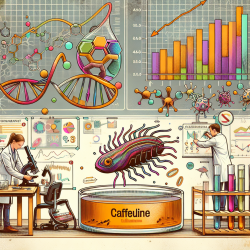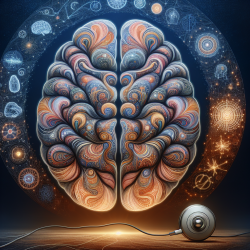Introduction
In the quest to enhance therapeutic strategies for childhood neurological disorders, a recent study titled "Caenorhabditis elegans provides an efficient drug screening platform for GNAO1-related disorders and highlights the potential role of caffeine in controlling dyskinesia" offers promising insights. This study, published in Human Molecular Genetics, explores the use of the nematode Caenorhabditis elegans as a model organism for drug discovery, specifically targeting GNAO1-related disorders. These disorders are characterized by severe neurological impairments, including developmental delays and movement disorders.
Key Findings
The study highlights the potential of caffeine as a therapeutic agent in controlling dyskinesia associated with GNAO1 mutations. Researchers introduced specific GNAO1 mutations into the C. elegans genome using CRISPR/Cas9 technology, observing that caffeine significantly improved motor function in these mutants. The mechanism is believed to involve adenosine receptor antagonism, suggesting caffeine's role as a bypass suppressor of aberrant motor functions.
Implications for Practitioners
For practitioners in speech-language pathology and child neurology, these findings open new avenues for intervention strategies. The use of C. elegans as a model organism provides a cost-effective and efficient platform for initial drug screening, potentially accelerating the development of therapies for GNAO1-related disorders. The study encourages practitioners to consider the role of caffeine and other adenosine receptor antagonists in managing dyskinesia, offering a new perspective on treatment options.
Encouraging Further Research
While the study provides a promising foundation, further research is essential to translate these findings into clinical practice. Practitioners are encouraged to explore the following:
- Investigate the long-term effects and safety of caffeine use in pediatric populations with neurological disorders.
- Examine the potential of combining caffeine with other therapeutic agents to enhance efficacy.
- Conduct clinical trials to validate the effectiveness of caffeine in managing dyskinesia in children with GNAO1 mutations.
Conclusion
The study underscores the importance of innovative research approaches in addressing complex neurological disorders in children. By leveraging simple model organisms like C. elegans, researchers can uncover new therapeutic pathways, ultimately improving outcomes for affected children. Practitioners are encouraged to integrate these insights into their practice and contribute to the growing body of research in this field.
To read the original research paper, please follow this link: Caenorhabditis elegans provides an efficient drug screening platform for GNAO1-related disorders and highlights the potential role of caffeine in controlling dyskinesia.










